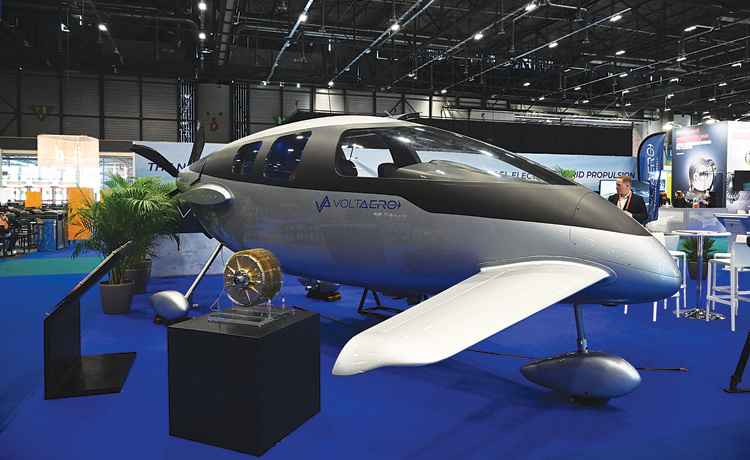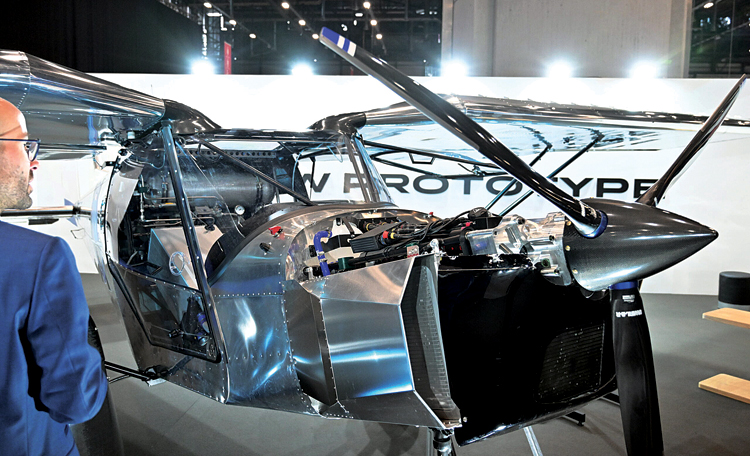Shaping Tomorrow’s Skies

With a strong focus on reducing carbon emissions and advancing fuel-saving technologies, this year’s convention brought together key developers and industry leaders dedicated to shaping a greener, more efficient aviation landscape. The event highlighted groundbreaking advancements in hydrogen-based propulsion systems and automated flight technologies, presenting a vivid picture of the future of aviation.
INNOVATION IN ADVANCED AIR MOBILITY
This year’s EBACE marked a milestone by prominently featuring leading AAM companies both in the Palexpo exhibit hall and outdoors at Geneva Airport. The event showcased cutting-edge, low-emission, and zero-emission AAM aircraft powered by hydrogen, electric, and hybrid-electric systems.
Experts at the conference discussed the future of automated commercial flights within the AAM sector, emphasising the need to safely integrate autonomous passenger aircraft into global airspace. Panelists highlighted the necessity of a collaborative approach involving engineers, regulators, and developers to uphold safety standards. Initial implementations may include highly automated systems assisting pilots, paving the way for fully autonomous flights.
EBACE2024 introduced an expanded Innovation Zone, featuring prominent eVTOL aircraft developers and other AAM ecosystem stakeholders as key speakers. At the Innovation Pavilion, pioneering AAM companies showcased their groundbreaking models, including:
- Beyond Aero: Presenting the ONE, the first electric business aircraft designed for hydrogen propulsion. After completing France’s first manned hydrogen-electric flight, Beyond Aero is now developing an electric business jet powered by a hydrogen fuel cell.
- ELECTRON: A Rotterdam-based company producing 100 per cent battery-powered aircraft for regional use, currently developing an all-electric cargo plane.
- Hydroplane Limited: This California company is developing a modular hydrogen fuel cell for general aviation, urban air mobility, and vertical lift aircraft.
- Lilium: Unveiling the first full-scale model of its all-electric vertical take-off and landing (eVTOL) Lilium Jet, set for market release in 2026.
- Vaeridion: A Munich-based company creating highly efficient electric-powered “microliners” aimed to commence operations before 2030.
- VoltAero: Designing hybrid-electric aircraft for passenger, cargo, and medical evacuation use, with the first flight of its full-scale Cassio 330 hybrid electric aircraft expected by year-end. Cassio was on display for the visitors at the show.
Conference sessions delved into topics such as hybrid hydrogen-electric eVTOLs, eVTOL vehicles and drones in emergency and humanitarian missions, and the role of hydrogen propulsion in achieving net-zero carbon objectives.
In other announcements:
- Satcom Direct announced Avcon Jet as the launch customer for its Plane Simple fuselage-mounted Ku-band electronically-steered antenna (ESA), linking aircraft to the Eutelsat OneWeb satellite constellation.
- Climate Aero, based in the Netherlands, launched a platform to assist business aircraft operators in addressing environmental concerns. Offering free services to aircraft owners, Climate Aero’s database of over 2,00,000 private aircraft enables transparent carbon emissions reporting, helping operators understand and improve their environmental impact.
- PHI Group signed a deal with Leonardo for up to 12 AW189 helicopters, including extensive support for maintenance, repair, overhaul, service center agreements, and training solutions for both the AW189 and the smaller AW139.
THE FUTURE OF AUTOMATION AND PROTECTIVE MEASURES
Integrating human pilots with automation could enhance operational effectiveness. The progression towards fully automated flights will depend on the reliability and acceptance of these systems. Experts at EBACE2024 concurred that completely replacing pilots with automated systems will take time. They emphasised the necessity for developers to collaborate and share safety insights to prevent mishaps. Automated aircraft could communicate with each other, enhancing safety by sharing real-time airspace information. Achieving autonomous passenger flights will require intricate collaboration across the entire aviation ecosystem, including air traffic control and aircraft systems, to ensure safe and efficient integration into global airspace.
THIS YEAR’S EBACE PROMINENTLY FEATURED LEADING ADVANCED AIR MOBILITY (AAM) COMPANIES SHOWCASING LOW-EMISSION AND ZERO-EMISSION AIRCRAFT POWERED BY HYDROGEN, ELECTRIC, AND HYBRIDELECTRIC SYSTEMS
The International Aircraft Dealers Association (IADA) has partnered with Jetquity to offer a programme designed to protect business aircraft buyers. The new Residual Value Guarantee Programme safeguards buyers against market volatility by agreeing to purchase aircraft at preset prices determined by algorithms and AI.

Celebrating its 10th anniversary, the International Business Aviation Council (IBAC) honored SRC Aviation of New Delhi, India, the first registered ground handler under the International Standard for Business Aircraft Handling (IS-BAH) programme. As part of this milestone, IBAC launched the "Elevating Ground Handling Safety" campaign, further enhancing safety standards in ground handling operations.
PIONEERING THE SUSTAINABLE PATH TO NET-ZERO EMISSIONS
EBACE2024 also strongly showcased the industry’s commitment to net-zero emissions and its progress toward its carbon goals with a three-day Sustainability Summit; a focus on the latest alternative propulsion technologies, including Swiss explorer Bertrand Piccard’s project to fly around the world in an aircraft powered by green hydrogen; an AAM aircraft on the outdoor display for the first time; an innovation pavilion with nextgeneration planes; and the unveiling of new set of sustainability standards for the industry.
SAF was made available at the Geneva Airport for those traveling to the annual EBACE2024. Jet Aviation delivered a 35 per cent blend of SAF to GVA for the event, marking the company’s third year providing SAF for EBACE.
The business jet CEOs at the conference discussed strategies for achieving net-zero emissions by 2050. Key approaches included SAF, low-emission propulsion systems, improved aircraft design, and industry-wide collaboration. They emphasised the need for increased SAF production, regulatory incentives, and significant investment in green technologies. Future solutions that were underlined included hybrid electric and hydrogen propulsion, along with sustainable manufacturing practices.
Globally, SAF production is less than one per cent of jet fuel consumption, primarily through HEFA, which uses used cooking oils, fats, and greases. Concerns exist about HEFA feedstock availability. Other production pathways, like alcohol-to-jet from ethanol and power-to-liquid using electricity, are emerging. Blended SAF is available at around 30 European airports, with upcoming regulations favoring larger airports.
They stressed the importance of SAF, predicting the development of new low-emission platforms with hybrid electric propulsion systems, a future where hydrogen plays a crucial role in achieving net-zero emissions, importance of green manufacturing practices and highlighted ongoing investments in innovation driving efficiency gains in aircraft design and propulsion.
Boeing Business Jets announced its leadership role in NASA’s sustainable flight demonstrator project, aiming for significant fuel efficiency gains to support the industry’s net-zero goals.

With European Union mandates on SAF set to start next year, experts at EBACE2024 noted a growing demand and increasing availability for this eco-friendly Jet A alternative globally.
SAF, made from sustainable feedstocks like cooking oils, biomass, and agricultural residues, is key to achieving net-zero carbon emissions by 2050, potentially reducing lifecycle emissions by up to 80 per cent. At the convention, a panel of SAF experts discussed the ongoing challenges as business aviation adopts this new fuel.
The EU’s ReFuelEU Aviation Initiative mandates a minimum two per cent SAF share at EU airports by 2025, increasing to six per cent in 2030, 20 per cent in 2035, and 70 per cent by 2050.
Other countries like Portugal, France, and Germany are also implementing SAF mandates. The UK has a similar proposal, starting next year, requiring a 10 per cent blend by 2030 and a SAF usage mandate beginning in 2025. SAF mandates are also in place in Norway, Sweden, and France.
Some airports offer book-and-claim transactions for SAF, allowing operators to purchase SAF credits even if the fuel isn’t available at their location. However, EU regulations currently hinder the use of these certificates to meet upcoming mandates.
An Exhibitor Sustainability Pledge was one another way organisers and participants for the EBACE2024 took meaningful steps toward producing a more sustainable event. Exhibitors signing the pledge agree to take at least five actions to show their support. These include carbon offsets for staff traveling to and from Geneva, reusing elements from past exhibits, creating graphics and signage with 75 per cent recycled materials and much more.
S.T.A.R.S.: SETTING A NEW STANDARD IN AVIATION SUSTAINABILITY
The Standards & Training for Aviation Responsibility and Sustainability (S.T.A.R.S.) programme provides a comprehensive framework for organisations to seamlessly integrate environmental and social strategies. By aligning with the Business Aviation Commitment on Climate Change (BACCC) and the United Nations Sustainable Development Goals, S.T.A.R.S. aims to propel business aviation companies towards a more responsible and sustainable future.
Introduced at the 2019 European Business Aviation Convention & Exhibition (EBACE), S.T.A.R.S. was developed by a group of young professionals from various European aviation companies who first proposed the idea at the One Young World Summit. This year’s official launch builds on the groundwork laid during EBACE2022, where participants outlined the pilot programme’s schedule.
Tier 1 of S.T.A.R.S. focuses on self-assessment and the development of policies aimed at continuous progress toward environmental and social sustainability. These policies cover areas such as greenhouse gas emissions reporting, waste and water management, non-discrimination, inclusiveness, a new code of conduct, and data privacy and security. Tiers 2 and 3 involve implementation stages designed to comply with international standards.
S.T.A.R.S. is part of a broader series of innovative steps taken by the business aviation sector to reach net-zero carbon emissions by 2050, a goal established by the BACCC and reinforced by the CLIMBING. FAST. campaign. It complements the National Business Aviation Association’s (NBAA) award-winning Sustainable Flight Department Accreditation Program.
EBAA’S COMMITMENT TO THE CLIMBING. FAST. CAMPAIGN
At EBACE2024, EBAA formally joined the CLIMBING.FAST. campaign, a global initiative dedicated to achieving net-zero carbon emissions in aviation by 2050. The campaign aims to raise awareness among policymakers and opinion leaders about the societal benefits of business aviation, including job creation, economic development, community connectivity, and humanitarian aid. By joining this initiative, EBAA ensures alignment with European regulatory and cultural norms. CLIMBING.FAST. was launched in 2023 at the NBAA Business Aviation Convention & Exhibition.
These initiatives highlight the proactive steps the business aviation sector is taking to achieve a sustainable future, with the ultimate goal of net-zero carbon emissions by 2050. EBACE2024 painted a vibrant and promising future for aviation, where sustainability and innovation are at the forefront. The initiatives showcased at the convention underscored the industry’s unwavering commitment to achieving net-zero emissions and integrating advanced air mobility technologies. By fostering collaboration among developers, regulators, and engineers, EBACE2024 set the stage for a safer and more efficient global airspace.





